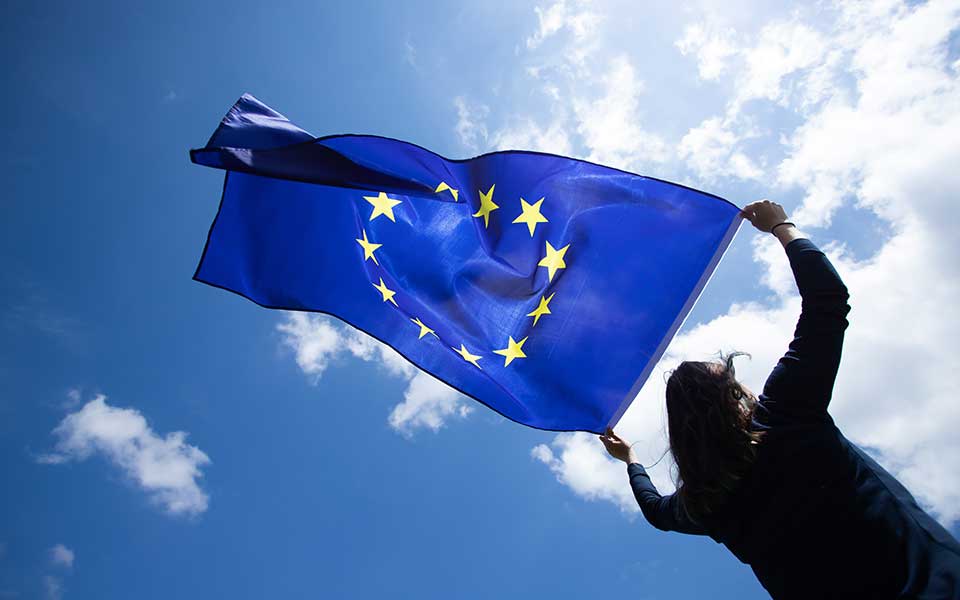On Wednesday, May 26, at 6 p.m. Greek time, Prime Minister Kyriakos Mitsotakis will be in conversation with Daniel Ziblatt, Harvard professor of public policy and co-author of the much discussed 2018 book “How Democracies Die.”
The event, which will be live streamed on www.culturalsociety.gr, is organized by the Thessaloniki-based Cultural Society of Entrepreneurs of Northern Greece and was the idea of New Democracy MP and Panteion University professor Dimitris Keridis, who will also moderate the debate. Alongside the prime minister, former vice president of the Greek government Professor Evangelos Venizelos will also talk with Ziblatt, as will the rector of Panteion University, Christina Koulouri, and Elaine Papoulias, executive director of the Minda de Gunzburg Center for European Studies at Harvard University.
The event is titled “200 Years of Independent Greece, 1821-2021: From the Ideal to the Practice of Democracy, Then and Now.” It takes the opportunity of the bicentennial commemoration to explore the pioneering role of Greece at the European level in adopting democratic models of representation from the early 19th century until today.
On the occasion of this event, Professor Ziblatt talked to Kathimerini.

© Annette Hornischer
Greeks were among the first people in Europe to create a democratic nation-state in the 19th century governed by a democratic constitution. One hundred and fifty years later, Greece became one of the first 10 members of the European Union in 1981, just seven years after the end of the seven-year military junta. Can Greece serve as a shining example in the current era of autocracies and offer some optimism that democracy is resilient enough to overcome all setbacks?
The great Harvard political scientist Samuel Huntington argued that democracy sweeps the world in great spurts, a phenomenon that he called democracy’s “three waves,” the first beginning in the 1830s, the second after 1945, and third after 1974. What’s so striking if one looks back to both the first wave and the third wave is that Greece is always there, in 1821 and in 1981, a precursor of what’s to come elsewhere.
The recent resilience of Greek democracy in the face of momentous economic crises, we can hope, is a harbinger of resilience elsewhere. The main point I would make, however, is that democracy is not a machine that runs on its own; it requires skilled leadership to overcome forces of polariziation, political courage to withstand the appeals of demagogues and, of course, a bit of good luck.
The Greek contradiction was that democracy almost collapsed in 2015 because of a referendum for the EU support package that was hailed as a celebration of “direct democracy.” Why do more and more voters in democratic countries seem to be ready to empower autocratic politicians to undermine democracy by winning elections?
Throughout history, there have always been demagogues who are happy to use the institutions of democracy to accrue power and in the process destroy democracy. In recent years, this threat has become more significant for a couple of reasons. One key factor is that the mediating institutions of our democracies – political parties, interest groups, media institutions – have weakened; in some ways the rise of social media and new political parties looks “democratizing,” but the paradox of our time is that these changes have helped open the door to demagogues, making it easier today for them to gain power. A second key factor that has harmed democracy in the US, though to a lesser degree in Europe, is the rise of polarization, which creates a politics where rivals increasingly regard each other as enemies. This raises the temperature on our politics and can be dangerous.

© Shutterstock
The US Republican Party is persistently dominated by the belief that the 2020 elections were “stolen.” Do they believe that was the case because so many blacks and Latin American voters participated in the electoral process for the first time? Is US democracy in a continuing danger because of pervasive and persistent racism? Can Joe Biden’s agenda for democracy save the day?
African American and non-white voter turnout has been rising for a generation; this is not the first time voter turnout was so high. More significant is that the Republican Party, which remains a predominately white party in an increasingly diverse society, is fearful of the future. Younger voters are also much more likely to be Democratic Party supporters. All of this means Republicans have an existential dread about the future. When a party fears the future, it is tempted to cheat now to avoid that future.
President Biden hopes that by leading a rapid economic recovery in America he can reduce the polarization and inflamed passions of our politics, leading to bigger Democratic Party majorities that will allow him to implement institutional reforms to help mend our democracy.
Governments around the globe are accused of curtailing fundamental rights and constitutional freedoms because of Covid-19, and many fear they might be tempted to continue using some of those powers to fine-tune their control over societies, even after the pandemic ends. They even used massive-scale powerful surveillance systems for the first time. Is there more need to strengthen the constitutional checks and balances against excessive use of government power?
Our democracies have responded to Covid in a confusing way. Some, including the US, responded originally with an extensive system of checks and balances with extreme incompetence. So checks and balances didn’t help us there. But the US project of vaccinations has proved a great success, again in a system with those same checks and balances. This leads me to think institutions mattered less than good leadership in responding to the Covid crisis. But when it comes to what helped our democracies survive as democracies, it is clear constraints on power are always important. The challenge of our era is responding to existential crises – like future epidemics or climate change – with our democracies intact.
This article was first published in ekathimerini.com.
The event will be broadcast live on the Cultural Society’s website, www.culturalsociety.gr, and its Facebook page, @PolitistikiEtaireia, with simultaneous translations from Greek and English.












